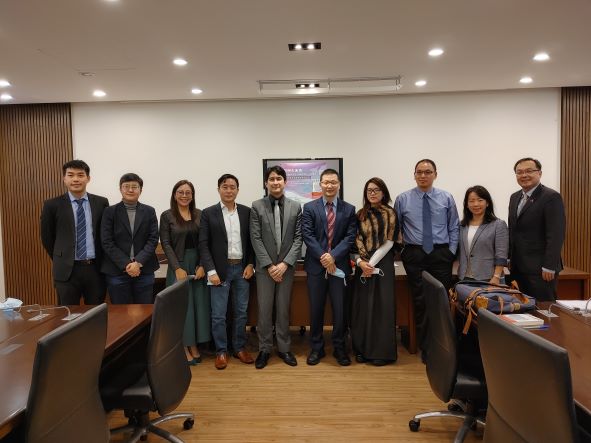[Seminar] 2022/12/12 Book Launch: New Asian Regionalism and International Carrer
《亞洲大未來:經濟整合與全球典範轉移的新趨勢》發表會暨國際職涯座談

On December 12th, 2022, a book launch was held at NTU College of Law to promote Professor Pasha Hsieh’s new book, New Asian Regionalism, as well as to discuss various career options on the international level. The book launch was hosted by Professor Yueh-Ping (Alex) Yang, the Director of ACWH, participated by established professionals, including De-Ming Zhu, General Counsel of Mercedes-Benz; Shiuan-Di (Sandy) Lin, Esq. of Weil, Gotshal & Manges; Kuang-Wei Chueh, Esq. of Ernst & Young; Helen Hai-Ning Huang, Esq. of Lee and Li, Chia-Ching (Marc) Cheng, Executive Director of EUTW; Professor Ying-Jun Lin of CYCU Law; and Mao-Wei Lo, JSD Candidate of Stanford Law.
The main speaker of the event, Pasha Hsieh, is a Professor of Law at Singapore Management University who is also the Associate Dean of Singapore Management University and Jean Monnet Chair in EU-ASEAN Law and Relations. Instead of adopting the conventional ways, Professor Hsieh conducted his book launch in a more interactive approach that focused on the exchange of opinions between guest speakers regarding the content of the book and the advice on legal careers.
The launched book, New Asian Regionalism, is a translated version of New Asian Regionalism in International Economic Law, another book authored by Professor Hsieh. In his book, Professor Hsieh thoroughly discussed the various aspects of the integration of the Asian regional economy and emphasized Asia’s importance to international trade orders. Professor Hsieh believes that the progression of ASEAN members towards regional integration would gradually lead to transformations of economic relationships worldwide, and Asia, as the initiator of these changes, would ultimately become the center of international trade and investment.
During the discussion, Mr. De-Ming Zhu recommended students who wish to pursue an international career learn different languages because languages provide not only a means of communication but also an opportunity to understand the values and culture of different countries. Shiuan-Di (Sandy) Lin, Esq. encouraged students to step beyond the scope of legal studies and enjoy the positive aspects of life. On top of the Third Wave of Regionalism mentioned by Hsieh in his book, Kuang-Wei Chueh, Esq. pointed out the possibility of the Forth Wave and further predicted that the international trade order would gradually transform into a group-based or region-based competition instead of a brawl between individual players. Based on her experience in green energy, Helen Hai-Ning Huang, Esq. pointed out the concept of “localize to internationalize,” stating that the “international vision” may be developed locally as well. Mr. Chia-Ching (Marc) Cheng elaborated on Zhu’s recommendation for language learning and further emphasized the importance of interdisciplinary studies. Professor Ying-Jun Lin expressed her view on the international situation and expressed her belief that Asia’s regional integration is beneficial for incorporating Asian values into the current international trade system. Finally, bringing the focus back to Taiwan, Mr. Mao-Wei Lo reflected briefly on the question of whether the inheritance-based legislation model is suitable for Taiwan in an age of rapid reform in international trade.
At the Q&A session, in response to the audience’s question on the development of various international dispute settlement systems, Professor Hsieh pointed out that WTO’s dispute settlement system remains the mainstream due to its competence and accessibility; that said, it faces certain challenges nowadays, which may reduce its efficiency in settling disputes. Whether other region-based or investor-state dispute settlement systems may replace WTO as a more prominent system in the future is worth observing.
The book launch was conducted with active discussions and fruitful reflections, which allowed the participants to have an in-depth understanding of Professor Hsieh’s new book, New Asian Regionalism, and different career paths on the international level. At the end of the book launch, Professor Hsieh also shared his experience working at the WTO and the internship opportunities to encourage students to broaden their horizons by participating in internship programs. The book launch was successful, and it was undoubtedly a great experience for both the guest speakers and the participants.
.jpg)
謝笠天教授今日(12月12日)於臺灣大學法律學院舉行新書《亞洲大未來:經濟整合與全球典範轉移的新趨勢》發表會暨國際職涯座談。本次講座由亞洲WTO暨國際衛生法與政策研究中心主任楊副教授岳平主持,朱德明法務長、林宣蒂律師、闕光威律師、黃海寧律師、鄭家慶執行長、林映君教授及羅懋緯講師蒞臨與談。
謝笠天教授任教於新加坡管理大學,並任該大學法學院副院長;此外,謝教授亦經歐盟頒授莫內講座,2022年第一學期亦在臺灣大學擔任客座教授。謝教授於今日的講座突破以往新書發表會模式,著重在諸位與談人就新書以及現今法律人國際職涯展望之討論與經驗分享。
本書《亞洲大未來:經濟整合與全球典範轉移的新趨勢》為謝笠天教授所著英文書籍New Asian Regionalism in International Economic Law中譯版本。書中針對亞洲區域經濟整合之各面向提供系統性、全面性探討,並強調亞洲於現今時代對全球經貿秩序之重要性。伴隨東南亞國協等開發中國家貿易力量的區域性整合,亞洲乃至全球貿易關係皆產生重大變革;而帶動變革之亞洲區域,將成為各國投資與貿易中心。
在與談階段,朱德明法務長在國際職涯發展面向,建議與會同學進修不同語言;因學習語言不僅為了溝通,同時也是對不同國家價值觀及文化學習過程,有助於跨國企業之深度溝通、交流。林宣蒂律師向同學們提出三個建議,即不應限縮在法律領域、不要忘了享受生活中的美好,並推薦相關文章。闕光威律師針對謝笠天教授書中提及之第三波區域主義,點出第四波區域主義之可能;並由自身觀察,認為未來將形成以集團對抗為中心的經貿秩序。黃海寧律師綜合其在能源開發領域的經驗,就法律人的國際職涯規畫提出「越在地、越國際」的概念,在臺灣亦能發展國際投資視野。鄭家慶執行長之分享與朱法務長關於加強語言的建議不謀而合,並進一步強調法律人跨領域學習之重要性。林映均教授針對亞洲及國際情勢提出看法,指出亞洲區域的整合突破了以往西方國家建立之經貿秩序,並正在將亞洲價值試圖融入國際主流。羅懋緯講師則回歸到臺灣角度,省思如今經貿變革的時代,以往移植外國立法例的模式是否仍適合我國。
在最後的問答環節,同學針對現今國際爭端解決機制的選擇提出問題。謝笠天教授對此認為,雖然WTO因其爭端解決體制,目前仍是各國貿易爭端主要的救濟途徑,但實務上運作的困難導致爭端解決效率減弱;未來區域性的爭端解決機制或是投資爭端解決機制亦有可能取代當今主流模式。
整體新書發表會上,謝笠天教授與諸位與談人討論熱烈,與會者對於新書內容以及法律人國際職涯展望亦提供了更深刻的理解。謝教授也在最後分享WTO工作及實習機會,鼓勵同學積極參與實習並累積不同經驗。相信此次講座對於講者、與談人以及與會同學均有非常難得的收穫!